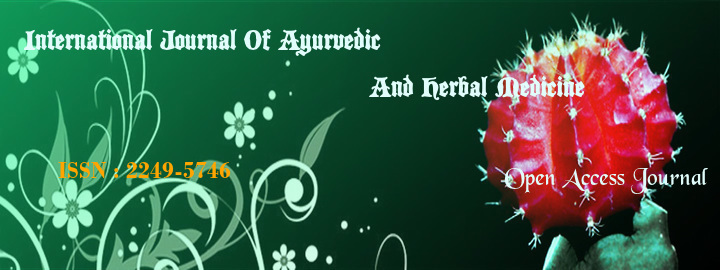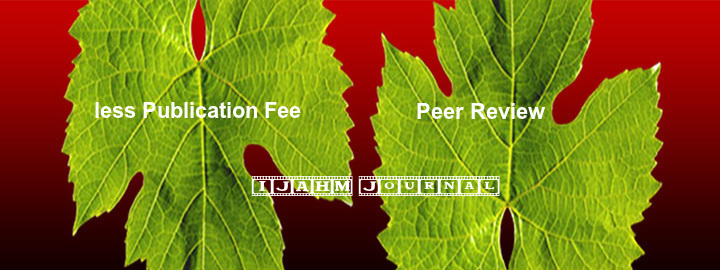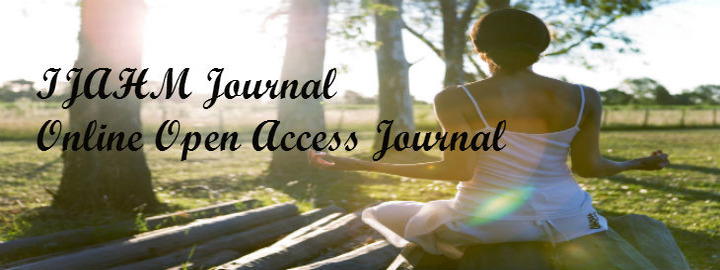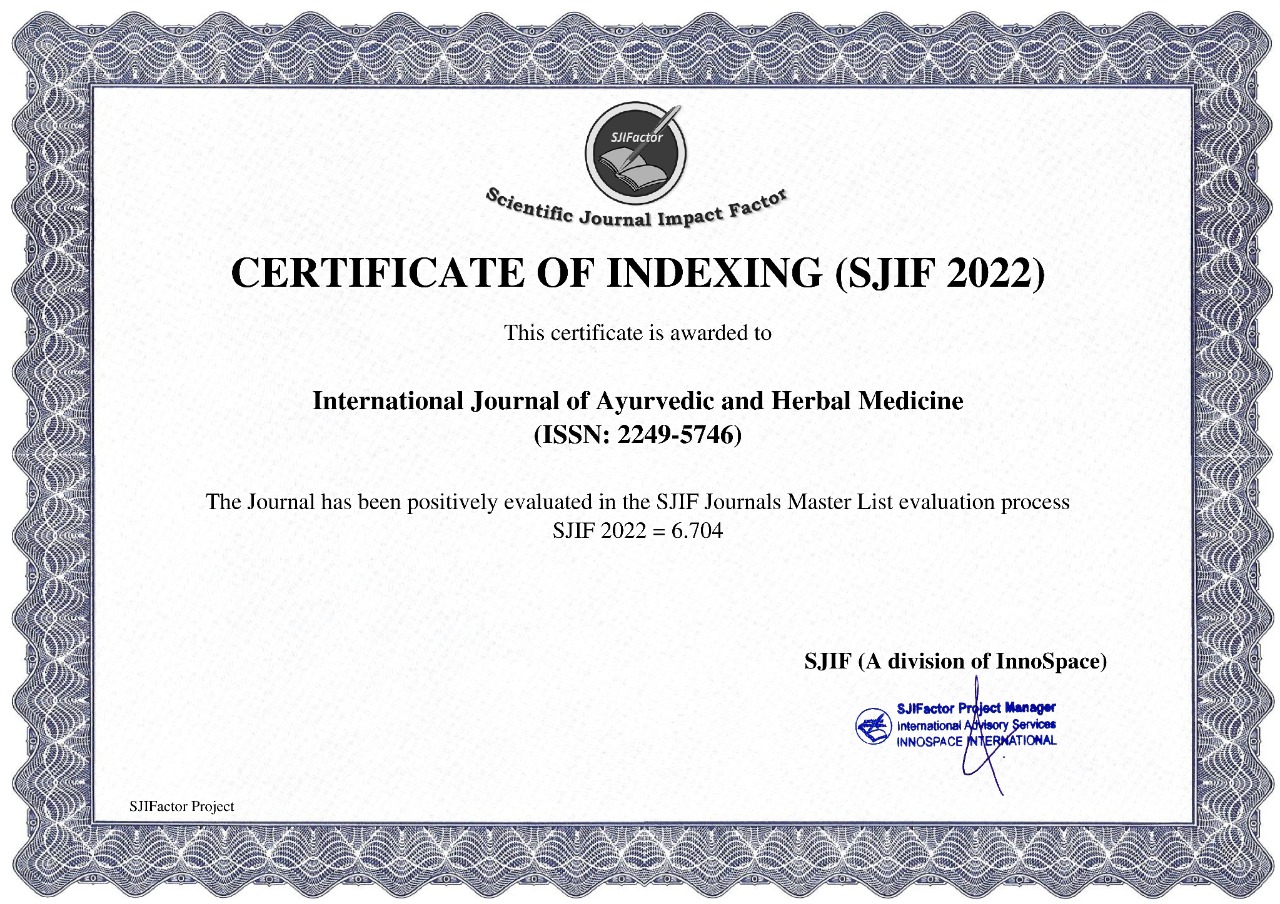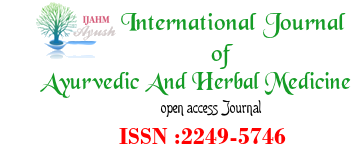


B. Mounika1, I. Bala Tripura Sundari2.
DOI : http://dx.doi.org/10.31142/ijahm/v9i2.03
1M Pharmacy, Sri Venkateshwara College of Pharmacy, Osmania University, Hyderabad-81.
2Assistant Professor, Sri Venkateshwara College of Pharmacy, Hyderabad-81.
Corresponding Author: B. Mounika
Sri Venkateshwara College of Pharmacy, Madhapur, Hyderabad-81.
ABSTRACT:
Objective: To formulate and evaluate anti-inflammatory activity of Hibiscus emulgel.
Methods: The emulsions of methanolic extract of Hibiscus were prepared by using different oils like light liquid paraffin, coconut oil, olive oil and by using varying concentrations of Tween80 and Span80. Based on the physicochemical characteristics the best selected emulsion was formulated into emulgel by using different gelling agents like Carbopol 934,HPMC E15, NaCMC in different ratios. Optimization of the prepared emulgel formulations was done based on for their physicochemical parameters and percentage drug release. Optimized formulation OEG4 was evaluated for Anti-inflammatory activity using carrageenan-induced rat paw oedema model.
Results: The present investigation shows the physicochemical characterization of prepared emulgels such as spread ability, viscosity, drug content, In vitro diffusion studies, stability studies. The stability studies were performed as per ICH guidelines at two different temperatures for 3months i.e., room temperature (25±20C/60+5%RH) and (40±2̊C/75+5%RH). The drug content of the optimized formulation OEG4 was monitored for a period of 90days. The optimized emulgel formulation OEG4 was compared with Diclofenac sodium as a standard drug for evaluating theanti-inflammatory activity. The optimized formulation showed maximum inhibition of 85.46% was observed at 4hrs of administration. There was statistically significant reduction in paw edema by test gel (p<0. 01) when compared with standard emulgel.
Conclusion: The present study concluded that Hibiscus emulgel showed potential anti-inflammatory activity.
Key Words: Carbopol934, HPMC E15, HPMC K4M, NaCMC, Hibiscus, Emulgel.
REFERENCES:
1. Abbas A.B and Lichtman A.H. Chapter 2 Innate immunity. Brain Immunology. Functions and disorders of the immune system. ISBN 3ed. 2009; 978(1): 4160-4688.
2. Mohini P, Parag K, Shailesh K, Meghana L, Sanlhah B, Pravin C. Evaluation of anti-inflammatory activity of herbal gel formultion. J.Nat.prod.Plant Resource; 2011;1(2):25-28.
3. J L Knee et al., Pharmacology; A Nursing process approach, 5th ed., Singapore: Elsevier publications. 2006.
4. DivyaJyothi, Marina K. Formulation and evaluation of an herbal anti-inflammatory gel containing TrigonellaFoenumGreacum seed extract.Int J Pharm Sci, 2016; 8(1) :41-44.
5. Parag A. Kulkarni, Shailesh K, MeghanaDhande, Mohini. A Phamse, Pravin D Chowdari. Der Pharm Chemica, 2010; 2(3): 338-342.
6. Vijay Kumar KS, Parthiban S, Senthil GPK, Tamiz TM. Ethosomes-A new trend in vescular approaches for topical drug delivery. Asian J. of Res Pharm Sci and Biotech. 2014; 2(1): 23-30.
7. Jordan SA, DG Cunningham, RJ Marles. Assessment of herbal medicinal products: Challenges and opportunities to increase the knowledge base for safety assessment. Toxicology and applied Pharmacology. 2010; 243:198-16.
8. Ajila C M, Prasad Rao U J. Protection against hydrogen peroxide induced oxidative damage in rat erythrocytes by Mangiferaindica L. peel extract. Food chemical toxicology. 2008; 46(1): 303-309.
9. B. R. Srinivas Murthy et al. Formulation and in vitro Evaluation of Liposomes loaded with Mupirocin, International Journal of Research in Pharmaceutical and Nano Sciences,4(3), 2015, 162-174.
10. Winter CA, Risley EA, Nuss GW. Carrageenan-induced edema in the hind paw of rat as an assay for anti-inflammatory activity. Proc SocExpBiol Med 1962; 111:544-7.
11. Rodriguez J, Di-pierro D, Gioia M. Effects of natural extracts from Mangiferaindica L and its active compound, mangiferin, on energy state and lipid peroxidation of red blood cells. Biochemical Biophysics. 2006; 1760 (9): 1333-42.
12. Ali, M.K., Ashraf, A., Biswas, N.N., Karmakar, U.K. and Afroz, S., 2011. Antinociceptive, anti-inflammatory and antidiarrheal activities of ethanolic calyx extract of Hibiscus sabdariffa Linn.(Malvaceae) in mice. Zhong xi yijie he xuebao= Journal of Chinese integrative medicine, 9(6), pp.626-631.
13. Chaurasiya, N. and Chakraborthy, G., 2014. Formulation and evaluation of herbal hydro gel from Hibiscus rosa-sinensis. Int J Curr Pharm Res, 6(1), pp.14-16.
14. Dafallah, A.A. and Al-Mustafa, Z., 1996. Investigation of the anti-inflammatory activity of Acacia nilotica and Hibiscus sabdariffa. The American journal of Chinese medicine, 24(03n04), pp.263-269.
15. Guddeti, V., Babu, D.M., Nagamani, B., Teja, M.R., Sravani, M.S. and Spandana, C.H., 2015. Evalutionof anti-inflammatory activity of Hibiscus rosasinensislinn. Flower extract in rats. International Journal of Pharmaceutical, Chemical & Biological Sciences, 5(3).
16. Narender, K.S., Kumar, D. and Kumar, V., 2009. Antinociceptive and anti-inflammatory activity of Hibiscus tiliaceus leaves. International Journal of Pharmacognosy and Phytochemical Research, 1(1).
17. Sultana, S., Al Faruq, A., Nahid-Al-Rashid, D., Nasim, T. and Ahsan, M.Q., In-vitro anti-inflammatory , anti-oxident and in-vivo analgesic, anti-diarrhel activities of fractional leaf extracts of Hibiscus surattensis.
18. Tomar, V., Kannojia, P., Jain, K.N. and Dubey, K.S., 2010. Antinoceceptive and anti-inflammatory activity of leaves of Hibiscus–rosasinensis. International Journal of Research in Ayurveda & Pharmacy, 1(1), pp.201-205.
19. Zhen, J., Villani, T.S., Guo, Y., Qi, Y., Chin, K., Pan, M.H., Ho, C.T., Simon, J.E. and Wu, Q., 2016. Phytochemistry, antioxidant capacity, total phenolic content and anti-inflammatory activity of Hibiscus sabdariffa leaves. Food chemistry, 190, pp.673-680.
20. Indira S, Priyanka R, Prathima S. Formulation and evaluation of ethosomal topical gels of Etoricoxib. International Journal for Pharmaceutical Research Scholars. 2015; 4(1): 93-103.
21. Esayed M M, Abdallah O Y, Naggar V F, Khalafallah N M. Lipid vesicles for skin delivery reviewing three decades of research. International journal of Pharmaceutics. 2007; 332: 1-16.
22. Winter CA, Risley EA, Nuss GW. Carrageenan-induced edema in the hind paw of rat as an assay for anti-inflammatory activity. Proc SocExpBiol Med 1962; 111:544-7
index







